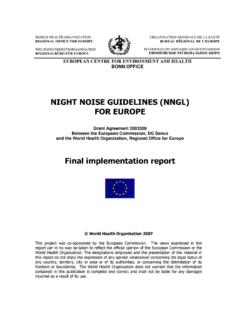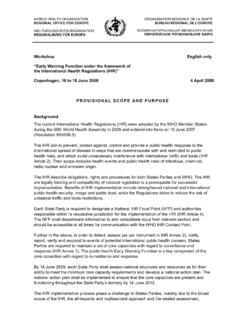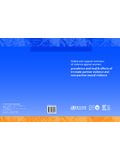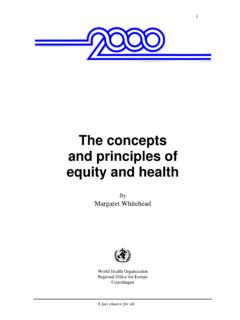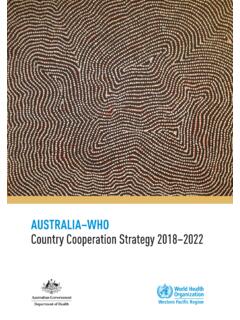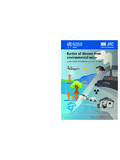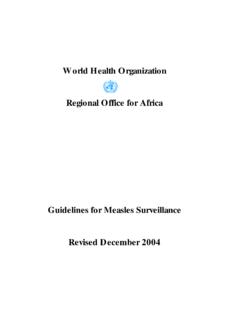Transcription of WORLD HEALTH ORGANIZATION
1 WORLD HEALTH ORGANIZATION regional OFFICE FOR THE WESTERN PACIFIC English only MEETING REPORT 24th MEETING OF THE TECHNICAL ADVISORY GROUP ON IMMUNIZATION AND VACCINE-PREVENTABLE DISEASES Convened by: WORLD HEALTH ORGANIZATION regional OFFICE FOR THE WESTERN PACIFIC Manila, Philippines 9 12 June 2015 Not for sale Printed and distributed by: WORLD HEALTH ORGANIZATION regional Office for the Western Pacific Manila, Philippines June 2015 2 NOTE The views expressed in this report are those of the participants of the 24th Meeting of the Technical Advisory Group on Immunization and Vaccine-Preventable Diseases in the Western Pacific Region and do not necessarily reflect the policies of the conveners. The Expanded Programme on Immunization of the WHO regional Office for the Western Pacific would like to thank the Ministry of HEALTH , Labour and Welfare of Japan for providing financial support for the meeting, including the production of this report.
2 This report has been prepared by the WORLD HEALTH ORGANIZATION regional Office for the Western Pacific for Member States in the Region and for those who participated in the 24th Meeting of the Technical Advisory Group in Immunization and Vaccine-Preventable Diseases in the Western Pacific Region in Manila, Philippines from 9 to 12 June 2015. 3 SUMMARY The Technical Advisory Group (TAG) on Immunization and Vaccine-preventable Diseases in the Western Pacific Region was established in 1991 with the following terms of reference: 1. to recommend, in coordination with the regional Certification Commission, technical issues regarding sustaining the poliomyelitis-free status of the Western Pacific Region and global certification of poliomyelitis eradication; 2. to review the epidemiological situation in the Western Pacific Region and recommend appropriate goals, targets, strategies and surveillance indicators, and monitor progress towards the reduction of vaccine-preventable diseases, including the control and elimination of measles and maternal and neonatal tetanus; 3.
3 To recommend suitable strategies and processes for the introduction and integration of new vaccines into the Expanded Programme on Immunization (EPI), including methods of monitoring progress for the diseases concerned; 4. to recommend suitable strategies for sustaining high-quality national immunization programmes in the Western Pacific Region, including management, vaccine supply, cold chain and the safety of injections; 5. to strengthen, in coordination with the Inter-agency Coordinating Committee, the active involvement of all institutions, national and international organizations, and political leaders concerned with immunization and vaccine-preventable disease control efforts in sustainable programme activities, including participation at the meetings of the Technical Advisory Group on EPI and Poliomyelitis Eradication and Inter-agency Coordination Committee meeting; and 6.
4 To advise the WHO regional Director for the Western Pacific Region on the above points. Since 1991 TAG has met annually to review the progress of the immunization programme in the Western Pacific Region and provide guidance on establishing and achieving immunization goals. The 24th TAG meeting was held in Manila, Philippines, from 8 12 June 2015. The meeting was attended by five TAG members, five temporary advisers, 23 participants from 15 countries and areas, 27 representatives from partner organizations, and WHO staff from headquarters, the regional Office for the Western Pacific and country offices. After the Global Vaccine Action Plan 2011 2020 was approved by the WORLD HEALTH Assembly (WHA) in 2012, the Western Pacific Region developed a regional Framework for Implementation of the Global Vaccine Action Plan in the Western Pacific.
5 In 2014, the sixty-fifth session of the regional Committee for the Western Pacific endorsed the regional Framework for Implementation of the Global Vaccine Action Plan in the Western Pacific in resolution The 24th TAG focused on reviewing progress towards the implementation of the regional framework. Topics included achieving targets and programme indicators for the polio endgame; measles, rubella, and maternal and neonatal tetanus elimination; and hepatitis B control. Discussions were also held on the acceleration of Japanese encephalitis (JE) control in the Western Pacific Region, introduction of affordable new vaccines, immunization supply chain systems, and the use of quality vaccines. The meeting also covered work towards the new regional immunization coverage goals that aim to ensure equity in immunization services to reach unreached target populations and improve data quality.
6 4 1. INTRODUCTION Meeting ORGANIZATION The meeting was attended by five Technical Advisory Group (TAG) members, five temporary advisers, 23 participants from 13 countries and areas, 40 representatives from partner organizations, and WHO staff from headquarters, the regional Office for the Western Pacific and country offices. The timetable of the meeting is provided in Annex 1. The list of participants is included in Annex 2. Meeting objectives The objectives of the meeting were: 1) to review progress, identify critical issues and discuss key actions to achieve regional immunization goals and strategic objectives as specified in the regional Framework for Implementation of the Global Vaccine Action Plan in the Western Pacific; and 2) to identify opportunities to enhance collaboration and coordination among immunization partners to support countries in implementing the regional Framework for Implementation of the Global Vaccine Action Plan in the Western Pacific.
7 2. PROCEEDINGS Opening session Dr Shin Young-soo, WHO regional Director for the Western Pacific, welcomed TAG members and participants to the 24th TAG meeting in the Western Pacific Region. He expressed immense pride with the accomplishments Member States have made since the last meeting. He acknowledged that Member States have adopted the regional Framework for Implementation of the Global Vaccine Action Plan in the Western Pacific and summarized recent immunization achievements in the Western Pacific Region. He also noted the substantial progress towards implementing the Polio Eradication and Endgame Strategic Plan 2013 2018 and expressed confidence with the target to introduce inactivated polio vaccine (IPV) by the end of 2015 and to switch to bivalent oral polio vaccine by April 2016. He further noted the progress made towards measles elimination with three more countries having achieved the interruption of endemic measles virus transmission for at least 36 months, and also noted the progress made towards the target of less than 1% hepatitis B chronic infection prevalence among 5-year-old children by 2017, as well as the progress in maternal and neonatal tetanus elimination in countries such as Cambodia and the Philippines, and the successful support of continuously expanding high-quality laboratory networks.
8 The regional Director also noted progress towards evidence-based vaccine introduction with Japanese Encephalitis (JE) vaccine, pneumococcal conjugate vaccine (PCV) and rotavirus vaccine, as well as the human papillomavirus (HPV) vaccination demonstration project in the Western Pacific Region. He also acknowledged the regional Alliance for National Regulatory Authorities for Vaccines in the Western Pacific for providing assistance to vaccine procuring countries to build sustainable regulatory systems. The regional Director concluded by thanking participants for making the Expanded Programme on Immunization a vibrant and innovative force in the Western Pacific Region. He emphasized working collaboratively to bring the benefits of strong national immunization programmes to the people in the Western Pacific Region no matter where they live or how limited their resources.
9 Global update on Global Vaccine Action Plan 5 Dr Thomas Cherian discussed progress on implementation of the Global Vaccine Action Plan 2011 2020 (GVAP), which is monitored annually by the WHO Strategic Advisory Group of Experts (SAGE) for immunization. The assessment of progress is reported annually to the WHO governing bodies. The 2014 SAGE report, which was presented to the WHO governing bodies in 2015, noted that progress against five of the six targets for 2014 and 2015 was not on track. WHO Member States highlighted a number of issues related to GVAP, including: (1) the affordability of new vaccines; (2) vaccine supply shortages and stock-outs; (3) the need to create greater awareness of the value of vaccines in order to mitigate hesitancy and refusals; (4) improvement in the quality and use of data; and (5) guidance for sustaining immunization services during periods of conflicts and crisis.
10 A resolution tabled by Libya calling for better access to sustained supply of vaccines at affordable prices was adopted by the WORLD HEALTH Assembly. National immunization programmes in most countries have evolved and become increasingly complex, but the HEALTH and immunization systems in many countries remain fragile. Raising the immunization coverage beyond 80% requires new strategies to identify and vaccinate children who are being repeatedly missed by the programme. Those strategies also must include an assessment of missed opportunities and next steps to address the problems. Solutions are available to address many of the challenges. WHO and the United Nations Children s Fund (UNICEF) have developed guidance to address the challenges. The new Gavi strategic plan provides opportunities to eligible countries to address the challenges they face.










